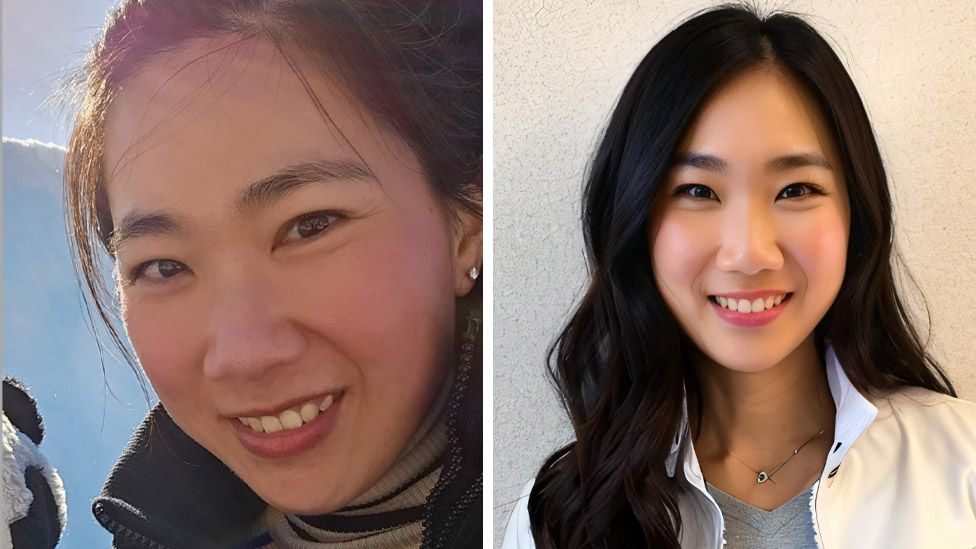
There is a trend among young adults to use AI to create professional-looking profile photos
By Perisha Kudhail
Business reporter
Filters and Photoshop move over, artificial intelligence (AI) is the new trend for creating online profile pictures.
Over the summer a video went viral on TikTok. It was captioned “using this trend to get a new LinkedIn headshot”.
In the short clip, a young woman shows both how she looks in real life, and the professional-looking headshot photos that she created using an AI-powered app called Remini. The video has now been watched 52.3 million times, and a host of similar ones from other TikTokers have also been extensively viewed.
Remini, and competitors such as Try It On AI and AI Suit Up, use AI-based software to create slick profile photos that aim to look as if they were taken by an expert photographer.
With Remini you are asked to upload eight to 10 selfies, preferably taken from different angles, and all in good lighting. The AI uses those pictures to learn about the way you look.
Then just a few minutes later it will start creating artificial photos of you looking very smart and even glamorous, with your hair in different styles or positions, and you wearing different clothes while sitting in perfect lighting.
It also gives you faultless skin, and improves your make-up. Plus, you get different backdrops. And some users find that it makes them look thinner.
The results are somewhat in the eye of the beholder – some say they are realistic, while others find that the images look artificial.
But while previous online image manipulation trends, such as drastically changing your hair or eye colour, have been about having fun on social media, this one is very much focused on LinkedIn and other job hunting websites.
For some the attraction of the AI services is that they are cheap.
Divya Shishodia, 24, a digital marketer, from Australia, says that while AI headshots “are obviously generated, some people might not have the budget to go and get a professional headshot taken”.
Image source, Divya Shishodia
Divya Shishodia, as she naturally looks on the left, and her AI-generated photo on the right
While going to a professional photographer can cost more than £100, Remini and the other providers will generally give you free trials lasting a few days.
“I’m not saying they’re the most realistic, but for the amount of time and effort you have to put in… the output is worth it,” says Ms Shishodia. She adds that, by contrast, if you try to take a decent profile photo yourself it can be very difficult.
“You need angles, lighting, you are trying to avoid shadows… only actual photographers can do it.”
For Michelle Genobisa, 26, from Aalborg, Denmark, it is the low to no cost of the AI generated profile photos that she is on board with.
“I quite often change my looks, like my hair colour… so it was an easy way to collect some pictures with the effect of a professional photoshoot,” she says. “To get that kind of photo taken, professionally, it’s very expensive.”
Others are less impressed by the technology, such as Molly McCrann, a 25-year-old actor from Australia. “I just think it looks so fake, you can tell that it looks heavily edited, or it looks like AI,” she says.
Image source, Molly McCrann
Molly McCrann says her AI version looks obviously fake
“When I posted mine it made me look so skinny, and I don’t look like that.”
Ms McCrann adds that she thinks it is probably better to show prospective employers what you actually look like.
However, she is also prepared to see the other side of the argument. “Someone wrote a comment that I actually agree with – if this company is going to base off looks, I want to get in the room. And if this is going to get me in the room, then I am going to use AI headshots to get the interview.”
But what about the potential impact that AI-improved images can have on our self-esteem? Consumer psychologist Dr Paul Marsden says there are two sides to the issue.
Users divided over AI generated profile pictures
“On one hand it could allow us to put our best self forward, and the image of ourselves that we want to project to the world, and in turn motivate us to be that way inclined in real life,” he tells the BBC.
“The psychology of first impressions is how we make snap decisions based on initial impressions, and by using AI people can put themselves in the running to potentially be considered for an opportunity. On the other hand it could affect people’s self-worth and beliefs that they themselves are not good enough comparatively to their AI generation resulting in low confidence.”
Do recruiters care? Tristan Barthel from London-based Tate Recruitment has seen a big rise in the number of people using AI to improve their photos.
He says that it makes no difference in how he deals with a person’s application. “I can see if a picture has been AI generated, and it wouldn’t affect my decision, for me it’s about the qualifications.”








